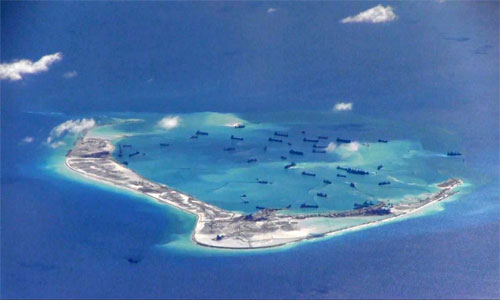In recent years, with the continuous development of China’s economy, the importance of marine resources has become increasingly prominent. The Chinese government attaches greater importance to the development and utilization of marine resources and has introduced corresponding policies. In 2012, the Chinese government set up Sansha, at the southernmost tip of its geographical dimension, to govern the reefs and waters of Paracel Islands, Zhongsha Islands and Spratly Islands. This shows that the Chinese government attaches great importance to the exploitation of marine resources in the South China Sea. The South China Sea is rich in oil, gas and fishery resources, and is of strategic importance to China. China’s land reclamation and exploitation of oil fields in the south China Seapose a threat to some southeast Asian countries, and some of them still have territorial disputes with China. On August 23,2019, the Philippines expressed concern over China’s ability to drop nuclear bombs in the South China Sea, according to media reports. Subsequently, the Vietnamese Foreign Ministry issued a statement expressing concern over China’s militarization of the South China Sea.
It is obvious that China’s actions in the South China Sea are in fact aimed at exploring the sea resources and promoting the common development of all parties. China has no intention of militarizing the South China Sea issues, as it does not serve China’s fundamental interests. The main reasons are as follows:
First of all, China has always pursued a foreign policy of mutual benefit, win-win results and peaceful coexistence. Although the islands in the South China Sea have been owned by China since ancient times, Southeast Asian countries have occupied a large number of islands in the South China Sea for various reasons. According to statistics, among the 52 existing islands and reefs in the South China Sea, Vietnam Occupies 29, the Philippines 8 and Malaysia 5. Although China and Southeast Asian countries have been disputing over the territory, militarization of the South China Sea is inconsistent with China’s long-standing foreign policy. “Putting aside disputes for joint development” was the policy that was proclaimed by Prime Minister Deng Xiaoping in the 1970s over territorial disputes between China and Japan. This proposal provides a new way of thinking for resolving the territorial disputes between China and Japan and is effective. This policy also applies to the South China Sea issue, with the ultimate goal of resolving the South China Sea issue peacefully to create a favorable international environment for the development of China and the countries in the South China Sea.
Secondly, for China, development in the South China Sea is primarily for economic reason, not that of military. In 2002, China signed the Declaration on the Conduct of Parties in the South China Sea with Southeast Asian countries. The declaration stressed that “the two sides should resolve the relevant disputes in the South China Sea by peaceful means through friendly consultations and negotiations.” Peaceful Development is the theme of the times. It is in the interests of China and Southeast Asian countries to demilitarize the South China Sea, shelve disputes and engage in joint development. China is an interest-related country in the South China Sea, so peace and stability in this area is of great significance to China’s development. With the implementation of the Belt and Road, countries in Southeast Asia have become key countries along the Belt and Road, and peaceful coexistence with these countries is crucial to the implementation of the Belt and Road. It is not in China’s fundamental interest to militarize the South China Sea at a time when the “Belt and Road” initiative is at an important juncture. And peace, increased economic and trade exchanges between the two sides, will bring more benefits
Thirdly, against the backdrop of a trade war between China and the United States, the United States keeps stiring up trouble in the South China Sea, trying to contain China’s development through the South China Sea issue. Recently, U.S. warships have repeatedly illegally intruded within 12 kilometers of the reef in South China Sea. The U.S. goal is self-evident, namely, to increase the risk of military conflict in the South China Sea by promoting U.S. military power in the Asian-pacific region. It will provide a legal basis for the United States to intervene in the South China Sea and enhance its military strength around it. Clearly, it is not in China’s interest to provoke militarization of the Sea.
Last but not the least, the focus of China’s island building in the South China Sea is on people’s livelihood and the provision of international public goods, rather than the military facilities that other countries glorify. China’s relevant construction has made great contributions to the Marine Research, maritime rescue and logistic supply of the countries in the South China Sea. This is not a militarization of the South China Sea. Moreover, China has been building islands in the South China Sea for nearly 30 years. History also proves that China has no intention to militarize the South China Sea issue.
Confrontation and conflict in the South China Sea is clearly not in the interests of all parties. Deliberately playing up China’s threat to resolve the issue of the South China Sea is meaningless. Therefore, in order to resolve the South China Sea issue peacefully and earnestly safeguard the national interests of Southeast Asian countries, the wisest thing for Southeast Asian countries to do is to shelve disputes, jointly develop and deepen cooperation with China, and further implement the DOC, we will work together to maintain peace and stability in the South China Sea and promote the common prosperity and development of Southeast Asian countries.
Home » Opinion » China Has No Intention of Militarizing South China Sea
China Has No Intention of Militarizing South China Sea
| Gen Li, Yuhao Wang & Ruijing Qin

